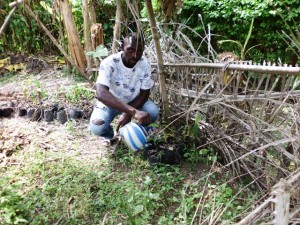Moringa and the food crisis, Green Cameroon in Community Development

Given the world food crisis, the use of local resources like Moringa is critical to reduce the dependence of developing countries on imported goods, and to improve nutrition among poor households. Two or three trees in a courtyard are sufficient for the needs of one family. The production of fresh or dried leaves is also a very profitable activity for growers in developing countries, allowing up to eight harvests per year with minimal investment.
In fact, African businesses that manufacture baby formula or nutritional supplements are becoming increasingly interested in Moringa leaf powder: it is a cheap resource which could allow them to enrich their products with micronutrients. But regulatory barriers prevent the commercialization of these enriched products, while the number of patents on the uses of Moringa is growing in the United States, China, and in Europe.
The current food crisis is proof that export-led agriculture is a wrong option for countries with few resources. At the same time, the poorest cannot afford animal-based proteins. It is therefore urgent for developing countries to rapidly switch to using local resources, including Moringa, whose exceptional nutritional value and accessibility make it a clear choice.
The main current need is for the financing of information campaigns, the publishing of a practical guide on the cultivation, processing, and use of Moringa leaves, and certification of the leaf powder as a food, a critical step to enable large-scale commercialization in Africa.
But despite the proliferation of public and private initiatives on Moringa, state-sponsored and UN-related programs have not gotten involved, and the funding is almost non-existent. There are only a few organizations that have supported this development in recent years. Among them, two European institutions: the Centre for Enterprise Development and the Technical Centre for Agricultural and Rural Cooperation and, more recently, the L’Occitane Foundation.
Green Cameroon is working together with some few local communities to support a group of women and youths from Bonavada villages in the planting of Moringa trees and we hope that in the nearest future we may proceed to support production in powder form, aimed for the local market. Partnerships are currently being searched in order to negotiate in an effort to sell the product to organizations and small-medium size businesses that work on malnutrition among mothers and children.
It is apparent to us that development policies should begin to incorporate these ideas. A “Future Development” approach must focus on youth’s and women’s productive role with projects that provide technology and training to them. Just as the World Bank incorporates elements of both approaches into programs that support education, credit, land titles, programs for environment, youth’s organizations and recognition of women’s work must be incorporated into all “Community development” projects.
Moringa’s Green Super foods Revolution is already creating positive impacts and is here to stay.
Njeke Joshua Egbe From Green Cameroon


I am a cameroonian based in kimba soith west. I have 120hs of land and i i will like
To do the moringa farming commercially. My question is:
How big is the market and can i get an aid or support to cultivate it from any organisation? Thanks
Good to read about the projects executed here in Green farm… its really a very big step. Courage.
Hello Green Cameroon friends. I am so glad that you are already making such a progress to situate moringa as a low cost alternative solution to the protein requirement of women and youth but I think the requirement is for all ages. Just like Nkamanyi Terence, I have developed interest in moringa and wish to have these two questions raised by Terence answered: How big is the market and can I get an aid or support to cultivate moringa from any organisation? I am particularly working with one of the biggest underprivileged children organisation in the South West Region of Cameroon.
Anxiously waiting to here from you.